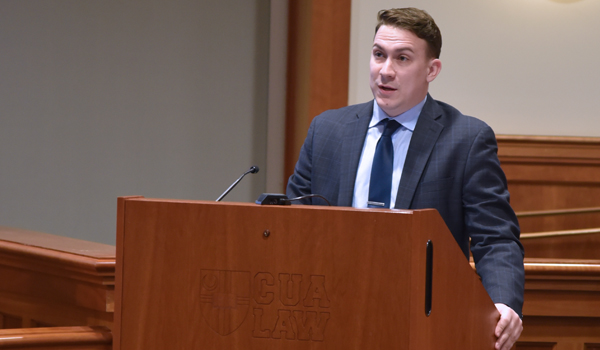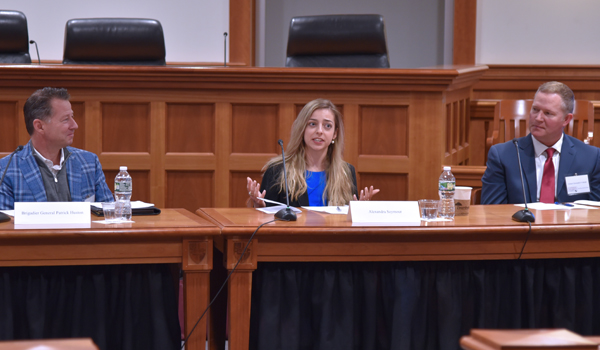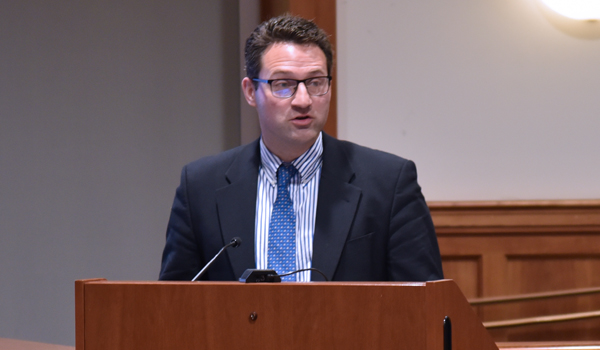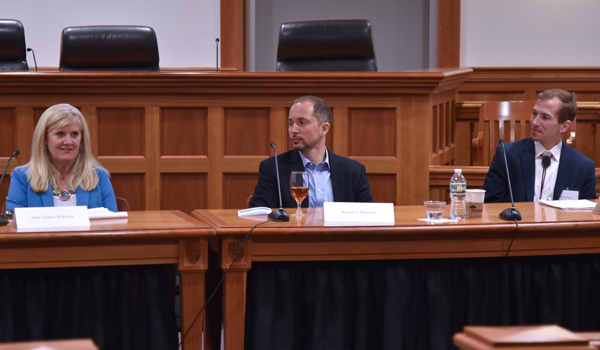 The Catholic University Journal of Law and Technology held its 2023 Spring Symposium on March 31, 2023. The program, Ask App Not to Track? Addressing National Security and Data Privacy Vulnerabilities in Wearable Technology, invited students, faculty, and guests to hear from experts providing in-depth analysis and exploration of security concerns related to wearable technology.
The Catholic University Journal of Law and Technology held its 2023 Spring Symposium on March 31, 2023. The program, Ask App Not to Track? Addressing National Security and Data Privacy Vulnerabilities in Wearable Technology, invited students, faculty, and guests to hear from experts providing in-depth analysis and exploration of security concerns related to wearable technology.
Zachary Aman (3L), Editor-in-Chief of the Catholic University Journal of Law and Technology (JLT), Vol. 31, welcomed attendees and provided a brief overview of the aims of JLT. As the publication's title suggests, JLT is committed to exploring and publishing scholarship on issues related to technology and the law. As technology regularly redefines the legal field, the questions posed by the symposium regarding wearable technology are more relevant than ever. Aman also took the opportunity to say a special thank you to the members of the JLT Executive Board for all of their hard work; Professor Elizabeth Winston for her guidance as faculty advisor; and Dean Steven Payne, the administration, faculty, and staff for their support.
After his opening remarks, Aman introduced Erhan Bedestani (4E). Following a brief introduction of the first panel, Bedestani introduced Brigadier General Patrick Huston.
Panel 1: Impact of Wearable Devices on National Security (Military/National Security Focus)
 Huston gave a brief overview and introduction to some of the types of wearable devices that are being used by those in the military, as well as some of the concerns surrounding the security of the data being collected. Following his overview each panelist introduced themselves and shared their views. Bedestani then took to the podium and moderated the discussion with a series of questions.
Huston gave a brief overview and introduction to some of the types of wearable devices that are being used by those in the military, as well as some of the concerns surrounding the security of the data being collected. Following his overview each panelist introduced themselves and shared their views. Bedestani then took to the podium and moderated the discussion with a series of questions.
Panelists: R. Patrick Huston, Brigadier General, U.S. Army (Retired); Colonel Christopher P. Mulder, Director, Air Force International Programs, Defense Security Cooperation Agency; and Alexandra Seymour, Associate Fellow, Technology and National Security Program, Center for a New American Security (CNAS).
 When the discussion concluded, Bedestani took some questions from the audience and then the symposium took a break for a networking lunch in the atrium. A group of current JAG officers were also present in the atrium to answer questions about the various opportunities available.
When the discussion concluded, Bedestani took some questions from the audience and then the symposium took a break for a networking lunch in the atrium. A group of current JAG officers were also present in the atrium to answer questions about the various opportunities available.
Following the luncheon, Bedestani took the podium to open up the second panel discussion. After a brief introduction of the second panel, Bedestani introduced Anne Toomey McKenna.
Panel 2: Wearable Devices and Data Privacy Concerns
 McKenna gave a brief overview and introduction to some of the types of wearable devices, as well as some of the data being collected by the companies that own them. She also touched on the concerns surrounding the security of the data being collected. Following her overview each panelist introduced themselves and shared their views. Bedestani again took to the podium and moderated the discussion with a series of questions.
McKenna gave a brief overview and introduction to some of the types of wearable devices, as well as some of the data being collected by the companies that own them. She also touched on the concerns surrounding the security of the data being collected. Following her overview each panelist introduced themselves and shared their views. Bedestani again took to the podium and moderated the discussion with a series of questions.
Panelists: Kevin Frazier, Clerk, Montana Supreme Court, Chief Justice Mike McGrath; Anne Toomey McKenna, Visiting Professor University of Richmond, School of Law • Penn State Institute for Computational & Data Sciences (ICDS), Affiliate Faculty • 2023 Chair, AI Policy Committee, and Chair, Privacy, Equity & Justice in AI Sub-Committee • Toomey McKenna Law Group LLC, Principal Counsel & Managing Partner; and Razvan E. Miutescu, Partner, Whiteford Taylor Preston LLP
Following the second panel, Aman offered thanks to each of the panelists and the audience for their time. Before he ended the session, he let those in attendance know that Huston will host a Q+A session on the Army JAG Corps in the Walter A. Slowinski courtroom. Huston was joined by two JAG officers, Tim Emmons and Drew Hopkins to answer questions about the various opportunities in the Army JAG Corps.
A recording of the symposium is available below:
